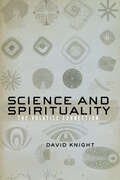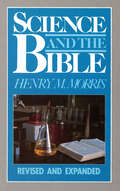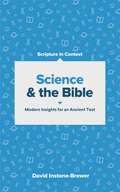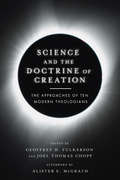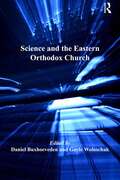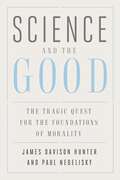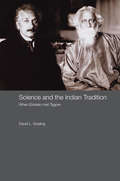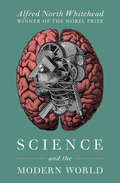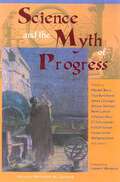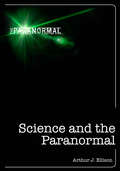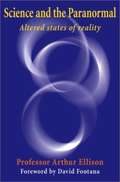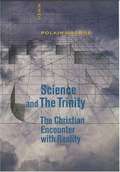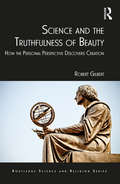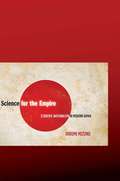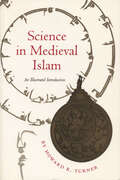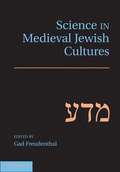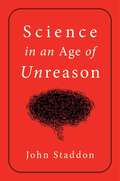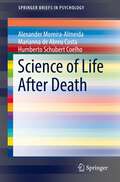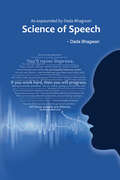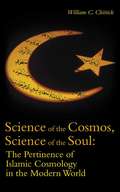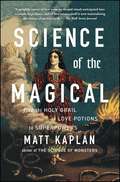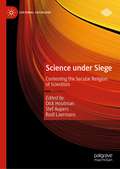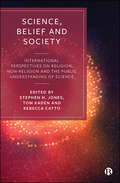- Table View
- List View
Science and Spirituality: The Volatile Connection
by David KnightUntil the end of the eighteenth century, almost everyone believed that the empirical world of science could produce evidence for a wise and loving God. By the twenty-first century this comforting certainty has almost vanished. What caused such a cataclysmic change in attitudes to science and to the world?Science and Spirituality offers a new history of the interaction between Western science and faith, which explores their volatile connection, and challenges the myth of their being locked in inevitable conflict.Journeying from the French Revolution to the present day, and taking in such figures as Francis Bacon, René Descartes, Charles Darwin, Immanuel Kant, Albert Einstein, Mary Shelley and Stephen Hawking, David Knight shows how science evolved from medieval and Renaissance forms of natural theology into the empirical discipline we know today. Focusing on the overthrow of Church and State in revolutionary France, and on the crucial nineteenth century period when a newly emerging scientific community rendered science culturally accessible, Science and Spirituality shows how scientific disenchantment has provided some of our most flexible and powerful metaphors for God, such as the hidden puppet-master and the blind watchmaker, and illustrates how questions of moral and spiritual value continue to intervene in scientific endeavour.
Science and the Bible
by Henry MorrisStudy scientific data and biblical truths in five chapters: Science in the Bible, The Theory of Evolution, Science and the Flood, The Bible and Ancient History, and Fulfilled Prophecy.
Science and the Bible
by Henry MorrisStudy scientific data and biblical truths in five chapters: Science in the Bible, The Theory of Evolution, Science and the Flood, The Bible and Ancient History, and Fulfilled Prophecy.
Science and the Bible: Modern Insights for an Ancient Text (Scripture in Context Series)
by David Instone-BrewerIs the Bible fundamentally at odds with science? Science and the Bible are often pitted against each other, causing many to either defend science at Scripture's expense, or vice versa. Instead, what if we saw them as friends? Can Christians appreciate scientific insights like they do archaeological discoveries--as a source of knowledge to illuminate the biblical world and our own? In Science a nd the Bible, David Instone-Brewer takes a refreshing and non-antagonistic approach, asking how science can aid our interpretation of the Bible. The result is stimulating on topics such as God's omnipresence, the origin of languages, the nature of eternity, the relationship of spirit and soul, the reality of resurrection, and Jesus' human experience. In short, readable chapters, Science and the Bible enables the curious layperson to reread the Bible with fresh perspectives from modern scientific insights. The Scripture in Context series is driven by the conviction that there is nothing as exciting, direct, provocative, and spiritually enlightening as the Bible when we read it as it was meant to be read. Each book in the series dives into the ancient cultural context behind Bible passages, examining the effect this context had on what the Bible writers were saying and how we should understand their words today. When we read the Bible in light of its context, it is anything but boring. Instead, God's word can speak to us as powerfully as it did to those who first read it.
Science and the Doctrine of Creation: The Approaches of Ten Modern Theologians
by Alister E. McGrathKevin J. Vanhoozer on T. F. TorranceKatherine Sonderegger on Karl BarthCraig G. Bartholomew on Abraham KuyperChristoph Schwöbel on Wolfhart Pannenberg
Science and the Eastern Orthodox Church
by Daniel Buxhoeveden Gayle WoloschakScience and the Eastern Orthodox Church explores core theological and philosophical notions and contentious topics such as evolution from the vantage point of science, Orthodox theology, and the writings of popular recent Orthodox critics as well as supporters. Examining what science is and why Eastern Orthodox Christians should be concerned about the topic, including a look at well known 20th century figures that are considered holy elders or saints in the Orthodox Church and their relationship and thoughts about science, contributors analyse the historical contingencies that contribute to the relationship of the Orthodox Church and science both in the past and present. Part II includes critiques of science and considers its limitations and strengths in light of Orthodox understandings of the experience of God and the so called miraculous, together with analysis of two Orthodox figures of the 20th century that were highly critical of science, it's foundations and metaphysical assumptions. Part III looks at selected topics in science and how they relate to Orthodox theology, including evolution, brain evolution and consciousness, beginning of life science, nanotechnology, stem cell research and others. Drawing together leading Orthodox scientists, theologians, and historians confronting some of the critical issues and uses of modern science, this book will be useful for students, academics and clergy who want to develop a greater understanding of how to relate Orthodoxy to science.
Science and the Good: The Tragic Quest for the Foundations of Morality (Foundational Questions in Science)
by James Davison Hunter Paul NedeliskyWhy efforts to create a scientific basis of morality are neither scientific nor moral: &“Important and timely.&”—The Wall Street Journal In this illuminating book, James Davison Hunter and Paul Nedelisky trace the origins and development of the centuries-long, passionate, but ultimately failed quest to discover a scientific foundation for morality. The &“new moral science&” led by such figures as E.O. Wilson, Patricia Churchland, Sam Harris, Jonathan Haidt, and Joshua Greene is only the newest manifestation of that quest. Though claims for its accomplishments are often wildly exaggerated, this new iteration has been no more successful than its predecessors. But rather than giving up in the face of this failure, the new moral science has taken a surprising turn. Whereas earlier efforts sought to demonstrate what is right and wrong, the new moral scientists have concluded, ironically, that right and wrong don&’t actually exist. Their (perhaps unwitting) moral nihilism turns the science of morality into a social engineering project. If there is nothing moral for science to discover, the science of morality becomes, at best, a feeble program to achieve arbitrary societal goals. Concise and rigorously argued, Science and the Good is a definitive critique of a would-be science that has gained extraordinary influence in public discourse today—and an exposé of that project&’s darker turn. &“Science and the Good is a closely argued, always accessible riposte to those who think scientific study can explain, improve or even supersede morality . . . A generous and thoughtful critique.&” —The Daily Telegraph
Science and the Indian Tradition: When Einstein Met Tagore (India in the Modern World #Vol. 3)
by David L. GoslingThis new text is a detailed study of an important process in modern Indian history. During the late nineteenth and early twentieth century, India experienced an intellectual renaissance, which owed as much to the influx of new ideas from the West as to traditional religious and cultural insights. Gosling examines the effects of the introduction of Western science into India, and the relationship between Indian traditions of thought and secular Western scientific doctrine. He charts the early development of science in India, its role in the secularization of Indian society, and the subsequent reassertion, adaptation and rejection of traditional modes of thought. The beliefs of key Indian scientists, including Jagadish Chandra Bose, P.C. Roy and S.N. Bose are explored and the book goes on to reflect upon how individual scientists could still accept particular religious beliefs such as reincarnation, cosmology, miracles and prayer. Science and the Indian Tradition gives an in-depth assessment of results of the introduction of Western science into India, and will be of interest to scholars of Indian history and those interested in the interaction between Western and Indian traditions of intellectual thought.
Science and the Modern World: Lowell Lectures, 1925
by Alfred North WhiteheadThe famed mathematician and philosopher takes readers on a journey into a new scientific age, exploring topics from relativity to religion. Alfred North Whitehead, one of the great figures in the philosophy of science, wrote this prescient work nearly a century ago. Yet, in an era that has us reckoning with science and technology&’s place and meaning in our lives, it remains as relevant as ever. Science and the Modern World puts scientific discovery into historical and cultural context—exploring the effects of science and people on each other. &“It is a work not only of the first importance but also of great beauty. . . . Vivid writing.&” —Nature
Science and the Myth of Progress
by Mehrdad M. ZarandiA collection of essays by scholars, philosophers, and scientists offering penetrating answers to some of the most important questions of the day.
Science and the Paranormal (The Paranormal)
by Arthur J. EllisonThe Paranormal, the new ebook series from F+W Media International Ltd, resurrecting rare titles, classic publications and out-of-print texts, as well as new ebook titles on the supernatural - other-worldly books for the digital age. The series includes a range of paranormal subjects from angels, fairies and UFOs to near-death experiences, vampires, ghosts and witchcraft. In facts, not fiction, this book presents the case for the paranormal. Changing the way we look at the universe is not easy, and requires a true openness to exploration and experiment. Professor Ellison suggests that most of us are conditioned by our Western science-based education to think that the universe is much simpler and 'material' than it really is. He argues that we should recognize the limits of the current scientific worldview which fails to account for genuine paranormal experiences, including phenomena such as out-of-body experiences (OBE), reliably reported by thousands of people.
Science and the Paranormal: Altered States of Reality
by Arthur J. EllisonReviews the empirical evidence for the existence of paranormal abilities, describes the author's experiences in this field, and gives practical advice for readers wishing to develop these abilities.
Science and the Trinity: The Christian Encounter with Reality
by John C. PolkinghorneMost often, the dialogue between religion and science is initiated by the discoveries of modern science--big bang cosmology, evolution, or quantum theory, for example. In this book, scientist-theologian John Polkinghorne changes the discussion. He approaches the dialogue from a little-explored perspective in which theology shapes the argument and sets the agenda of questions to be considered. The author begins with a review of approaches to science and religion in which the classification focuses on theological content rather than on methodological technique. He then proceeds with chapters discussing the role of Scripture, a theology of nature, the doctrine of God, sacramental theology, and eschatology. Throughout, Polkinghorne takes the perspective of Trinitarian thinking while arguing in a style that reflects the influence of his career as a theoretical physicist. In the final chapter, the author defends the appropriateness of addressing issues of science and religion from the specific standpoint of his Christian belief. His book provides an important model for theologians and scientists alike, showing how their two fields can inform one another in significant ways.
Science and the Truthfulness of Beauty: How the Personal Perspective Discovers Creation (Routledge Science and Religion Series)
by Robert GilbertWhen scientists describe their results or insights as 'beautiful', are they using the term differently from when they use it of a landscape, music or another person? Science and the Truthfulness of Beauty re-examines the way in which seeing beauty in the world plays the key role in scientific advances, and argues that the reliance on such a personal point of view is ultimately justified by belief that we are made in the 'image of God', as Christian and Jewish believers assert. It brings a fresh voice to the ongoing debate about faith and science, and suggests that scientists have as much explaining to do as believers when it comes to the ways they reach their conclusions.
Science for the Empire
by Hiromi MizunoMizuno (history, U. of Minnesota) explores the relationship between discourses of science, nationalism, and modernity in Imperial Japan, particularly focusing on competing promotions of science amongst Japanese technology-bureaucrats, Marxist intellectuals, and popular science writers engaged in the developing the new genre of popular science (tsuzoku kagagku) journalism and how those competing visions were eventually co-opted and mobilized by the Imperial state in support of wartime objectives. Annotation ©2009 Book News, Inc. , Portland, OR (booknews. com)
Science in Medieval Islam: An Illustrated Introduction
by Howard R. TurnerDuring the Golden Age of Islam (seventh through seventeenth centuries A. D. ), Muslim philosophers and poets, artists and scientists, princes and laborers created a unique culture that has influenced societies on every continent. This book offers a fully illustrated, highly accessible introduction to an important aspect of that culture-the scientific achievements of medieval Islam. Howard Turner opens with a historical overview of the spread of Islamic civilization from the Arabian peninsula eastward to India and westward across northern Africa into Spain. He describes how a passion for knowledge led the Muslims during their centuries of empire-building to assimilate and expand the scientific knowledge of older cultures, including those of Greece, India, and China. He explores medieval Islamic accomplishments in cosmology, mathematics, astronomy, astrology, geography, medicine, natural sciences, alchemy, and optics. He also indicates the ways in which Muslim scientific achievement influenced the advance of science in the Western world from the Renaissance to the modern era. This survey of historic Muslim scientific achievements offers students and general readers a window into one of the world's great cultures, one which is experiencing a remarkable resurgence as a religious, political, and social force in our own time.
Science in Medieval Jewish Cultures
by Gad FreudenthalScience in Medieval Jewish Cultures provides the first comprehensive overview by world-renowned experts of what we know today of medieval Jews' engagement with the sciences. Many medieval Jews, whether living in Islamic or Christian civilizations, joined Maimonides in accepting the rationalist philosophical-scientific tradition and appropriated extensive bodies of scientific knowledge in various disciplines: astronomy, astrology, mathematics, logic, physics, meteorology, biology, psychology, science of language and medicine. The appropriated texts - in the original or in Hebrew translation - were the starting points for Jews' own contributions to medieval science and also informed other literary genres: religious-philosophical works, biblical commentaries and even Halakhic (legal) discussions. This volume's essays will provide readers with background knowledge of medieval scientific thought necessary to properly understand canonical Jewish scientific texts. Its breadth reflects the number and diversity of Jewish cultures in the Middle Ages and the necessity of considering the fortunes of science in each within its specific context.
Science in an Age of Unreason
by John StaddonScience is undergoing an identity crisis! A renown psychologist and biologist diagnoses our age of wishful, magical thinking and blasts out a clarion call for a return to reason and the search for objective knowledge and truth. Fans of Matt Ridley and Nicholas Wade will adore this trenchant meditation and call to action.Science is in trouble. Real questions in desperate need of answers—especially those surrounding ethnicity, gender, climate change, and almost anything related to &‘health and safety&’—are swiftly buckling to the fiery societal demands of what ought to be rather than what is. These foregone conclusions may be comforting, but each capitulation to modernity&’s whims threatens the integrity of scientific inquiry. Can true, fact-based discovery be redeemed? In Science in an Age of Unreason, legendary professor of psychology and biology, John Staddon, unveils the identity crisis afflicting today&’s scientific community, and provides an actionable path to recovery. With intellectual depth and literary flair, Staddon answers pressing questions, including: Is science, especially the science of evolution, a religion? Can ethics be derived from science at all? How sound is social science, particularly surrounding today&’s most controversial topics? How can passions be separated from facts? Informed by decades of expertise, Science in an Age of Unreason is a clarion call to rebirth academia as a beacon of reason and truth in a society demanding its unconditional submission.
Science of Life After Death (SpringerBriefs in Psychology)
by Alexander Moreira-Almeida Marianna de Costa Humberto Schubert CoelhoThis book examines the best available empirical evidence regarding one of the most challenging and pervasive questions throughout ages, cultures, and religions: the survival of human consciousness after death. It begins with a contextual overview of belief in personal survival and refutes misguided historical and epistemological arguments against the notion of survival after death (e.g., irrational, purely religious, impossible to be addressed by science, that has been proved false by neuroscience). The book provides an overview of the scientific evidence regarding the survival of human consciousness after death, focusing on studies on mediumship, near-death and out-of-body experiences, and reincarnation.Featured topics of coverage include:The belief in life after death in the contemporary world as well as in the history of religions and philosophy.The key misguided arguments and prejudices against the academic study of afterlife survival.What constitutes empirical evidence for survival after death?The main explanatory hypotheses alternative to survival after death.The chief cultural barriers to a fair examination of the available evidence for survival of consciousness after death. Science of Life After Death is an essential resource for researchers, professors, and graduate students as well as clinicians, therapists, and other professionals in developmental and clinical psychology; spirituality, religious. and consciousness studies; psychiatry; neuroscience / neurology; phenomenology / philosophy; complementary and alternative medicine; and all interrelated disciplines.
Science of Speech
by Dada BhagwanThose seeking to lead a spiritual life may naturally become inspired to live in peace and non violence. To learn spiritual practices to develop these values, one may turn to spiritual teachers, and to variety of religion. But beginning to cultivate spiritual awareness is not always as simple as it seems – especially in family / unhealthy relationships, or while dealing with difficult people. Daily interactions such as these may feel like the very definition of conflict! In the book “Science Of Speech”, Gnani Purush (embodiment of Self knowledge) Dada Bhagwan offers key understanding about non violent communication, along with conflict resolution skills and conflict management strategies. His spiritual teaching on how to resolve conflict - or to avoid it altogether - is offered in the context of common and everyday relationship challenges. Whether wondering how to become more spiritual, or simply how to deal with negative people and difficult people, this book will prove invaluable.
Science of the Cosmos, Science of the Soul: The Pertinence of Islamic Cosmology in the Modern World
by William C. ChittickIslamic Intellectualism is dead: or so argues William Chittick in this radical new book challenging modern trends in religious thought. Whilst many may say that Islamic studies thrives as a subject, Chittick points to the words of one of his former Professors when describing young colleagues: "they know everything one can possibly know about a text, except what it says". Indeed, Chittick states that it is impossible to understand ancient Islamic texts without the years of contemplative study that are anathema to the modern education system. While the modern intellectual with faith often treats their studies and faith in two seperate spheres, Chittick argues that it is essential to return to the ways of the ancient Sufis, who viewed knowledge of the soul, the world, and God as an extension of the same thing, and he bemoans the loss of the spiritual and intellectual highs of the Medieval Islamic period.
Science of the Magical: From the Holy Grail to Love Potions to Superpowers
by Matt Kaplan“Filled with cool cocktail-party tidbits, Matt Kaplan considers how things that were once the stuff of legends could one day become reality” (The Atlantic) in this fun scientific inquiry into the mystical places and magical objects of ancient and contemporary lore—from the fountain of youth, to love potions, to Super Mario’s mushrooms.Can migrations of birds foretell our future? Do phases of the moon hold sway over our lives? Are there sacred springs that cure the ill? What is the best way to brew a love potion? How do we create mutant humans who regenerate like Wolverine? “In Science of the Magical, Matt Kaplan takes us on a journey spiced with the wonders of myth, history and art, leavened with impeccable research, endlessly fascinating. And the result is both a compelling read and a deeply thoughtful exploration of the world around us and the ways we seek to understand it” (Deborah Blum, author of The Poisoner’s Handbook). Like Ken Jennings and Mary Roach, Kaplan serves as a friendly armchair guide to the world of the supernatural. From the strengthening powers of Viking mead to the super soldiers in movies such as Captain America, Kaplan explores cultures and time periods to point out that there is often much more to these enduring magical narratives than mere fantasy. Informative and entertaining, Science of the Magical is “a sprightly survey” (The Wall Street Journal) and “a joy to read…highly recommended” (Library Journal, starred review).
Science of the Physical Creation in Christian Perspective (2nd Edition)
by Dewitt Steele Gregory ParkerTopics covered in this text book include atmosphere, weather, seas, molecules, weathering , erosion , waves , sound, light , color and many more.
Science under Siege: Contesting the Secular Religion of Scientism (Cultural Sociology)
by Dick Houtman Stef Aupers Rudi LaermansIdentifying scientism as religion’s secular counterpart, this collection studies contemporary contestations of the authority of science. These controversies suggest that what we are witnessing today is not an increase in the authority of science at the cost of religion, but a dual decline in the authorities of religion and science alike. This entails an erosion of the legitimacy of universally binding truth claims, be they religiously or scientifically informed. Approaching the issue from a cultural-sociological perspective and building on theories from the sociology of religion, the volume unearths the cultural mechanisms that account for the headwind faced by contemporary science. The empirical contributions highlight how the field of academic science has lost much of its former authority vis-à-vis competing social realms; how political and religious worldviews define particular research findings as favorites while dismissing others; and how much of today’s distrust of science is directed against scientific institutions and academic scientists rather than against science per se.
Science, Belief and Society: International Perspectives on Religion, Non-Religion and the Public Understanding of Science
by Stephen H. Jones, Tom Kaden and Rebecca CattoThe relationship between science and belief has been a prominent subject of public debate for many years, one that has relevance to everything from science communication, health and education to immigration and national values. Yet, sociological analysis of these subjects remains surprisingly scarce. This wide-ranging book critically reviews the ways in which religious and non-religious belief systems interact with scientific theories and practices. Contributors explore how, for some secularists, ‘science’ forms an important part of social identity. Others examine how many contemporary religious movements justify their beliefs by making a claim upon science. Moving beyond the traditional focus on the United States, the book shows how debates about science and belief are firmly embedded in political conflict, class, community and culture.
